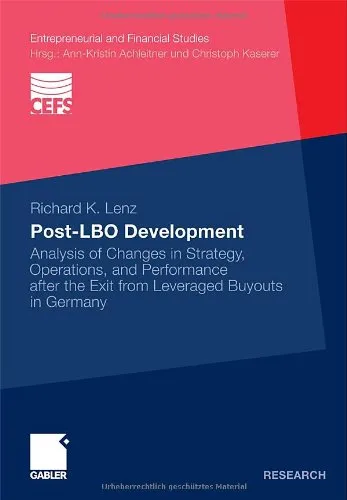Post-LBO Development: Analysis of Changes in Strategy, Operations, and Performance after the Exit from Leveraged Buyouts in Germany
4.4
Reviews from our users

You Can Ask your questions from this book's AI after Login
Each download or ask from book AI costs 2 points. To earn more free points, please visit the Points Guide Page and complete some valuable actions.Introduction to "Post-LBO Development: Analysis of Changes in Strategy, Operations, and Performance after the Exit from Leveraged Buyouts in Germany"
Leveraged buyouts (LBOs) have long been a pivotal aspect of the private equity industry, offering an effective tool for financial restructuring, operational optimization, and value creation. However, what happens after the LBO process? How do organizations evolve once private equity firms exit their investment? These are central questions explored in "Post-LBO Development: Analysis of Changes in Strategy, Operations, and Performance after the Exit from Leveraged Buyouts in Germany".
Through this book, I aim to investigate the critical linkages between the LBO process and the subsequent development of companies once they transition back to freedom from private equity supervision. The German market, being one of Europe’s largest and most dynamic economies with a unique corporate culture, offers a particularly interesting and underexplored setting for this research. By combining academic rigor with real-world insights, this text dives deep into what makes post-LBO companies successful, what challenges they face, and how they adapt to operating independently.
Detailed Summary
The book is organized around a robust analysis of post-LBO companies in Germany, blending qualitative and quantitative research methodologies. Leveraged buyouts are often associated with financial engineering and profit maximization over short time horizons, but the story does not end there. After the private equity firm's exit, freed companies frequently adopt new strategies, implement operational changes, and pursue long-term growth objectives.
The first section of the book introduces the concept of leveraged buyouts and provides an overview of the LBO lifecycle, with a specific emphasis on the exit phase. The following chapters delve into the intricate details of strategic reorientation, organizational restructuring, and performance improvement observed in post-LBO companies. Issues like leadership transition, corporate governance, and stakeholder management are examined closely.
By leveraging a dataset of German firms and interviews with executives and industry experts, I provide evidence-based conclusions on how organizations reshape themselves to thrive in a post-buyout environment. The German context—with its Mittelstand companies, collaborative industrial relations, and emphasis on long-term growth—uniquely influences the trajectory of post-LBO development, offering valuable lessons to a global audience.
Key Takeaways
- Private equity-backed companies that exit LBOs often experience a significant shift in governance structures and strategic priorities.
- Post-LBO success depends heavily on a firm's ability to maintain operational efficiency while transitioning to independence.
- Leadership during and after the transition phase is critical to establishing a sustainable growth trajectory.
- The broader economic and cultural environment, like that of Germany, plays a substantial role in shaping post-LBO development.
- Post-buyout companies often balance short-term financial goals with a long-term vision, leading to diverse outcomes depending on how effectively these priorities are managed.
Famous Quotes from the Book
“Transitioning from private equity management to operational independence is not just a financial change; it is a cultural transformation.”
“A successful post-LBO strategy is less about replicating past successes and more about redefining the path forward.”
“In Germany’s industrial ecosystem, post-LBO development is not merely a company-level phenomenon; it reflects systemic resilience and innovation.”
Why This Book Matters
This book addresses a critical gap in business and finance literature. While much attention is given to the financial engineering and execution of leveraged buyouts, the post-LBO phase—when companies are tasked with carving out a new trajectory—is still underexplored. This work offers fresh insights into the complexities of business evolution during this remarkable yet challenging phase.
For business leaders, academics, and policymakers, the lessons outlined in this book can pave the way for better understanding and managing post-LBO dynamics. At a time when Germany’s economic role in Europe continues to grow and private equity becomes an increasingly dominant force globally, studying these phenomena is not just useful but necessary.
Ultimately, this book serves as a resource for anyone interested in corporate strategy, operational transformation, and the broader effects of private equity on the business world. It not only highlights challenges but also showcases stories of innovation, adaptability, and resilience—elements that are at the heart of post-LBO success.
Free Direct Download
Get Free Access to Download this and other Thousands of Books (Join Now)
For read this book you need PDF Reader Software like Foxit Reader


